7th Annual ALLIES Civil Military Relations Conference
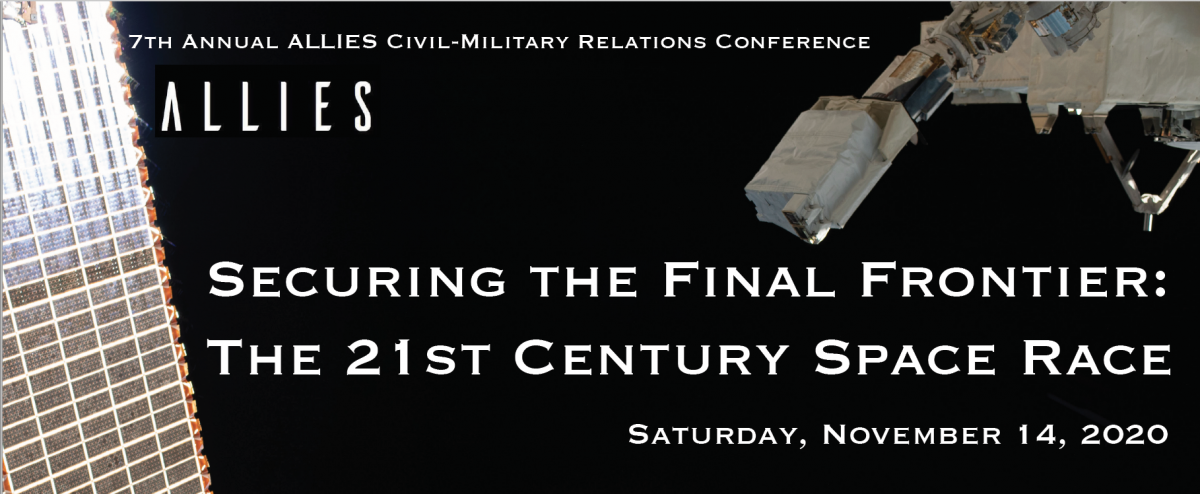
Conference Overview
Tufts ALLIES is proud to host our 2020 Civil-Military Relations Conference (CMRC) on Saturday, November 14th, 2020. This year’s theme is Securing the Final Frontier: The 21st Century Space Race. The keynote speaker for the conference is Paul Syzmanski, an expert on space warfare. The conference will be held online and will feature two panel discussions on the transformation of space into a domain for international conflict and the formation of America’s newest military service branch: the US Space Force.
Conference Schedule
Saturday, November 14, 2020
|
10:00am - 11:10am (EDT) |
Keynote Address by Dr. Paul Szymanski Dr. Paul Syzmanski, Outer Space Warfare Noted Author and Speaker at Space Strategies, expert in space warfare theory, policy, doctrine, strategies & tactics. |
|
11:30am - 12:45pm (EDT) |
Challenges to Security in Space This panel aims to provide participants with a better understanding of the barriers the US faces with maintaining and expanding current space operations and the importance of securing space-based services. Panelists will discuss foreign threats to our space operations and their impact on military, commercial, and civil sectors. This will provide a broad understanding of the growing importance of space in international security, and subsequently prepare them for the next panel where current and future American space operations will be explored. Dr. David Burbach, Associate Professor of National Security Affairs at the US Naval War College Dr. Damon Coletta, Associate Director at USAFA's Eisenhower Center for Space and Defense Studies. Dr. Everett Dolman, Professor of Comparative Military Studies at the US Air Force's Air Command and Staff College (ACSC). |
|
1:30pm - 2:30pm (EDT) |
U.S. Space Force This panel aims to provide an overview of America’s newest military service branch: the United States Space Force. Participants will hear about the Space Force’s origins as Air Force Space Command along with its transition into an independent service branch. Speakers will cover the Space Force’s mission and purpose of conducting space operations and maintaining satellite infrastructure. Participants will also hear the pros and cons of separating space operations into its own service branch as opposed to keeping them under the Air Force. Dr. Andrea Harrington, Department Chair of the Department of Spacepower and Director of the Schriever Space Scholars concentration at Air Command and Staff College. Dr. Peter Hays, Office of the Assistant Secretary of the Air Force for Space Acquisition and Integration, Adjunct Professor at George Washington University’s (GWU) Space Policy Institute. |
|
2:50pm - 3:25pm (EDT) |
Commercialization of Space and its Security Implications This presentation aims to provide an understanding of how private entities operate in space. In her examination of private space operations, CEO Katherine Monson will outline the different operations private companies undertake in space, how private companies interact with government regulators, and what role the U.S. Department of Defense plays in the commercialization of space. We will also explore whether the commercialization or space contributes to cooperation or competition in this domain. Katherine Monson, CEO of KSAT Inc. for Kongsberg Satellite Services (KSAT). |
|
3:45pm - 4:30pm (EDT) |
Closing Remarks: China’s Quest for Space Power This presentation seeks to explore the role that China currently plays in the space domain. Similar to the United States, China has exploration, economic and military goals in space. Often, these ambitions run counter to U.S. interests in space. Our speaker will seek to dissect the tension created by these conflicting interests to identify potential areas of conflicts. Our speaker will also explore the history of the US-Chinese relationship in space and attempt to identify potential areas of cooperation. Join us as we explore China’s quest for space power. |
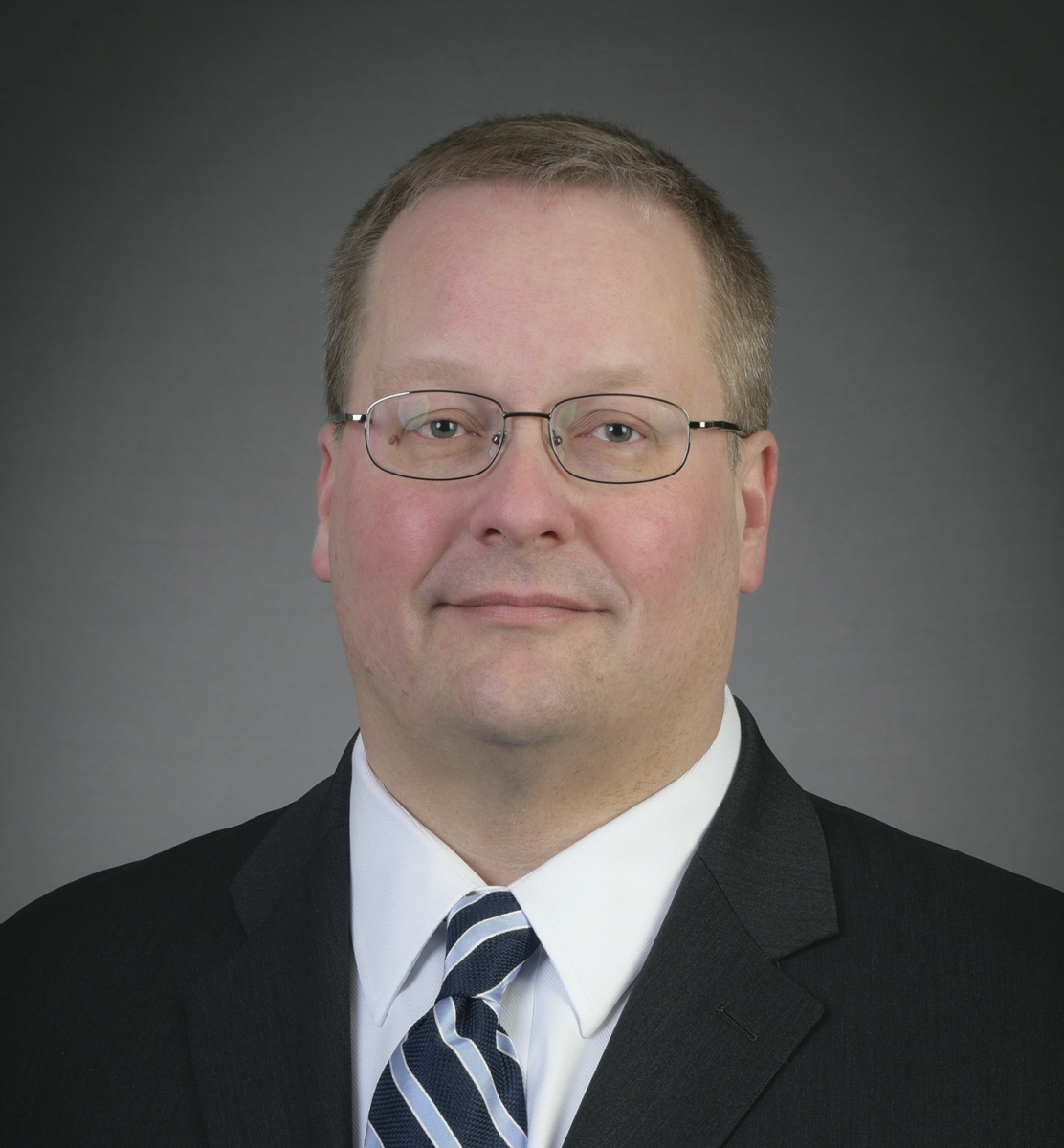 Dr. David T. Burbach Dr. David T. Burbach is an Associate Professor of National Security Affairs at the U.S. Naval War College in Newport, Rhode Island. He holds a PhD in Political Science from the Massachusetts Institute of Technology and currently teaches U.S. foreign policy, international relations, and space security. Prof. Burbach's scholarly interests include civil-military relations, defense planning, and the relationship between international security and technology, particularly with regards to space and nuclear policy. Before joining the Naval War College faculty in 2007, Prof. Burbach taught at the Army's School of Advanced Military Studies and also worked for several policy analysis and information technology organizations
Dr. David T. Burbach Dr. David T. Burbach is an Associate Professor of National Security Affairs at the U.S. Naval War College in Newport, Rhode Island. He holds a PhD in Political Science from the Massachusetts Institute of Technology and currently teaches U.S. foreign policy, international relations, and space security. Prof. Burbach's scholarly interests include civil-military relations, defense planning, and the relationship between international security and technology, particularly with regards to space and nuclear policy. Before joining the Naval War College faculty in 2007, Prof. Burbach taught at the Army's School of Advanced Military Studies and also worked for several policy analysis and information technology organizations
 Damon Coletta Dr. Damon Coletta is Scowcroft Professor in the Dept. of Political Science at the United States Air Force Academy. He edits the Eisenhower Center peer-reviewed journal, Space & Defense, and recently completed a book on technology and international security, Courting Science: Securing the Foundation for a Second American Century (Stanford University Press, 2016). He holds a Ph.D. in Political Science from Duke University; a Master’s in Public Policy (S&T) from the Harvard Kennedy School; and a Master’s and Bachelor’s in Electrical Engineering from Stanford University.
Damon Coletta Dr. Damon Coletta is Scowcroft Professor in the Dept. of Political Science at the United States Air Force Academy. He edits the Eisenhower Center peer-reviewed journal, Space & Defense, and recently completed a book on technology and international security, Courting Science: Securing the Foundation for a Second American Century (Stanford University Press, 2016). He holds a Ph.D. in Political Science from Duke University; a Master’s in Public Policy (S&T) from the Harvard Kennedy School; and a Master’s and Bachelor’s in Electrical Engineering from Stanford University.
 Everett Dolman Dr. Everett Carl Dolman is Professor of Comparative Military Studies at the US Air Force’s Air Command and Staff College (ACSC). His focus is on international relations and theory, and he has been identified as Air University’s first space theorist. Dr. Dolman began his career as an intelligence analyst for the National Security Agency, and moved to the United States Space Command in 1986. In 1991, he received the Director of Central Intelligence’s Outstanding Intelligence Analyst award. Dr. Dolman received his PhD in Political Science from the University of Pennsylvania in 1995. He then taught international relations and international political economy at The College of William & Mary, Southern Illinois University-Edwardsville, and Berry College before taking his current position at Maxwell AFB in Alabama. Dr. Dolman received the Air Force’s Educator of the Year Award for 2003/04. His published works include Astropolitik: Classical Geopolitics in the Space Age (2002); The Warrior State: How Military Organization Structures Politics (2004), Pure Strategy: Power and Principle in the Information Age (2005), and Can Science End War? (2015). He has written numerous book chapters as well as articles for the Journal of Strategic Studies, Comparative Strategy, Journal of Small Wars and Insurgencies, Soviet and Post-Soviet Review, Citizenship Studies, Politics and Society, Journal of Political and Military Sociology, Strategic Studies Quarterly, and The Air and Space Power Review. Dr. Dolman is also co-founder and editor emeritus of Astropolitics: The International Journal of Space Power and Policy.
Everett Dolman Dr. Everett Carl Dolman is Professor of Comparative Military Studies at the US Air Force’s Air Command and Staff College (ACSC). His focus is on international relations and theory, and he has been identified as Air University’s first space theorist. Dr. Dolman began his career as an intelligence analyst for the National Security Agency, and moved to the United States Space Command in 1986. In 1991, he received the Director of Central Intelligence’s Outstanding Intelligence Analyst award. Dr. Dolman received his PhD in Political Science from the University of Pennsylvania in 1995. He then taught international relations and international political economy at The College of William & Mary, Southern Illinois University-Edwardsville, and Berry College before taking his current position at Maxwell AFB in Alabama. Dr. Dolman received the Air Force’s Educator of the Year Award for 2003/04. His published works include Astropolitik: Classical Geopolitics in the Space Age (2002); The Warrior State: How Military Organization Structures Politics (2004), Pure Strategy: Power and Principle in the Information Age (2005), and Can Science End War? (2015). He has written numerous book chapters as well as articles for the Journal of Strategic Studies, Comparative Strategy, Journal of Small Wars and Insurgencies, Soviet and Post-Soviet Review, Citizenship Studies, Politics and Society, Journal of Political and Military Sociology, Strategic Studies Quarterly, and The Air and Space Power Review. Dr. Dolman is also co-founder and editor emeritus of Astropolitics: The International Journal of Space Power and Policy.
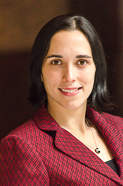 Dr. Andrea Harrington Dr. Andrea Harrington currently serves as Department Chair of the Department of Spacepower and Director of the Schriever Space Scholars concentration at Air Command and Staff College, where she is an Associate Professor of Military and Security Studies. She serves as a member of the editorial board for both New Space and the American Bar Association publication The Air and Space Lawyer. She is a licensed attorney in the Commonwealth of Massachusetts.
Dr. Andrea Harrington Dr. Andrea Harrington currently serves as Department Chair of the Department of Spacepower and Director of the Schriever Space Scholars concentration at Air Command and Staff College, where she is an Associate Professor of Military and Security Studies. She serves as a member of the editorial board for both New Space and the American Bar Association publication The Air and Space Lawyer. She is a licensed attorney in the Commonwealth of Massachusetts.
Dr. Harrington previously served as the Associate Director of the LLM Program in Air and Space Law at the University of Mississippi, where she taught International Space Law, US Domestic Space Law, International Private Air Law, US National Aviation Law, and Remote Sensing Law. She has been Associate Chair for the Policy, Economics, and Law Department for the International Space University’s 2018 Space Studies Program, Assistant Editor for the Annals of Air and Space Law, Jr. Project Manager for Secure World Foundation, and researcher on projects for the FAA Center of Excellence for Commercial Space Transportation, the International Society for the Advancement of Space Safety (IAASS), the International Civil Aviation Organization (ICAO), and the Space Security Index.
Dr. Harrington was an Erin J.C. Arsenault Fellow in Space Governance at the McGill University Institute of Air and Space Law (IASL), where her doctoral research focused on insurance and liability issues for the commercial space industry. Dr. Harrington holds a DCL and LLM from the McGill IASL, as well as a JD with High Honors from the University of Connecticut School of Law, an MSc in European Politics and Governance from the London School of Economics, and a BA in International Relations and History from Boston University (Magna Cum Laude). Prior to transitioning to air and space law, she was active in the insurance and financial compliance fields.
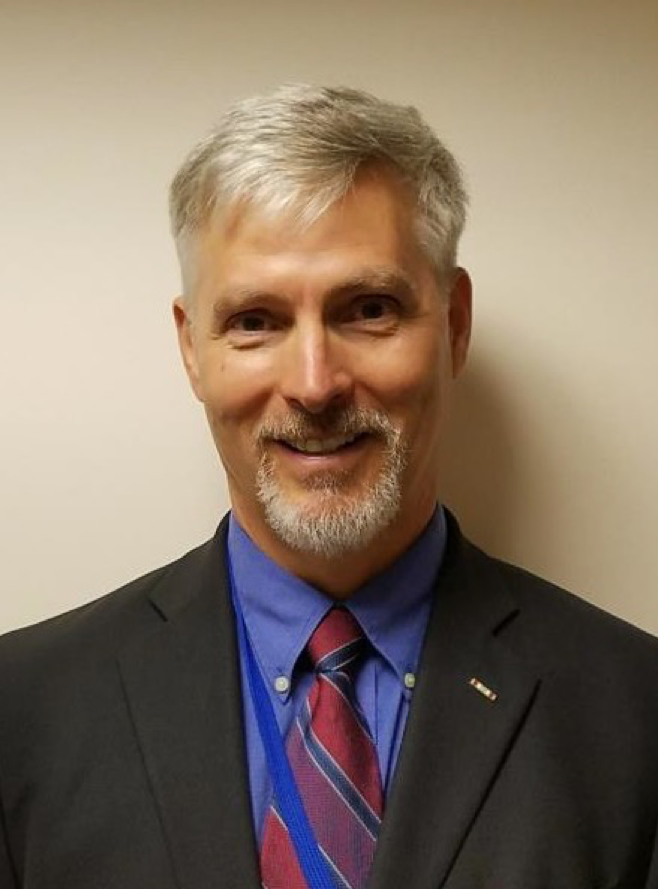 Peter Hayes Peter L. Hays supports the Office of the Assistant Secretary of the Air Force for Space Acquisition and Integration and is an Adjunct Professor at George Washington University’s (GWU) Space Policy Institute. He has been directly involved in helping to develop and implement major national security space policy and strategy initiatives since 2004 and serves as a senior advisor on governance, cadre, acquisition, and strategic messaging issues. Dr. Hays served as an Air Force officer from 1979-2004; flew C-141 cargo planes; and previously taught at the Air Force Academy, Air Force School of Advanced Airpower Studies, and National Defense University; he now teaches Air- and Spacepower Seminars at the Marine Corps School of Advanced Warfighting and the Space and National Security and the Science, Technology, and National Security Policy graduate seminars at GWU. Hays holds a Ph.D. from the Fletcher School and was an Honor Graduate of the Air Force Academy. Major publications include: Handbook of Space Security, Space and Security, and Toward a Theory of Spacepower.
Peter Hayes Peter L. Hays supports the Office of the Assistant Secretary of the Air Force for Space Acquisition and Integration and is an Adjunct Professor at George Washington University’s (GWU) Space Policy Institute. He has been directly involved in helping to develop and implement major national security space policy and strategy initiatives since 2004 and serves as a senior advisor on governance, cadre, acquisition, and strategic messaging issues. Dr. Hays served as an Air Force officer from 1979-2004; flew C-141 cargo planes; and previously taught at the Air Force Academy, Air Force School of Advanced Airpower Studies, and National Defense University; he now teaches Air- and Spacepower Seminars at the Marine Corps School of Advanced Warfighting and the Space and National Security and the Science, Technology, and National Security Policy graduate seminars at GWU. Hays holds a Ph.D. from the Fletcher School and was an Honor Graduate of the Air Force Academy. Major publications include: Handbook of Space Security, Space and Security, and Toward a Theory of Spacepower.
 Katherine Monson Katherine Monson is the CEO of KSAT Inc. for Kongsberg Satellite Services (KSAT). KSAT is a world-leading provider of ground station services for satellites, rocket launchers, and experimental spacecraft – supporting over 96% of commercial satellites launched into NGSO during the last two years. With over 50 years of experience, KSAT’s network today spans over 180 antennas at 20 ground station locations across the globe (including Pole to Pole coverage from Antarctica to the Arctic), and is constantly expanding. KSAT is proud to be the behind-the-scenes bridge back to earth, supporting the vast majority of space companies, agencies, and start-ups.
Katherine Monson Katherine Monson is the CEO of KSAT Inc. for Kongsberg Satellite Services (KSAT). KSAT is a world-leading provider of ground station services for satellites, rocket launchers, and experimental spacecraft – supporting over 96% of commercial satellites launched into NGSO during the last two years. With over 50 years of experience, KSAT’s network today spans over 180 antennas at 20 ground station locations across the globe (including Pole to Pole coverage from Antarctica to the Arctic), and is constantly expanding. KSAT is proud to be the behind-the-scenes bridge back to earth, supporting the vast majority of space companies, agencies, and start-ups.
Katherine began her career in aerospace as an early member of Spire Global. During her tenure at Spire, Katherine led the Ground Station department, building out a global network of infrastructure to download data from the constellation of over forty spacecraft.
Katherine is an avid hiker and enjoys learning new languages and exploring new places. She lives in Boulder County, Colorado.
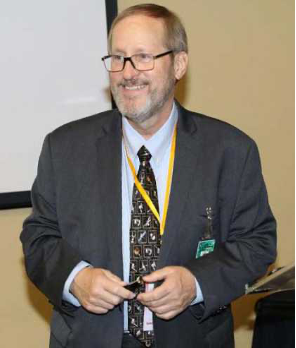 Paul Szymanski Mr. Szymanski has extensive experience in all fields related to space control: policy, strategy, simulations, surveillance, survivability, threat assessment, long-range strategic planning, and command and control. In addition, he has a comprehensive experience base, having worked directly with multiple services (Air Force, Army, Navy, Marines), civilian agencies (NASA, DARPA, FEMA), and from the Pentagon (Secretary of the Air Force) to systems development (Space and Missile Systems Center), technology development (Air Force Research Lab) to operational field test (China Lake Naval Test Center). This gives him a unique perspective in understanding the divergent issues associated with each step of the DOD procurement process.
Paul Szymanski Mr. Szymanski has extensive experience in all fields related to space control: policy, strategy, simulations, surveillance, survivability, threat assessment, long-range strategic planning, and command and control. In addition, he has a comprehensive experience base, having worked directly with multiple services (Air Force, Army, Navy, Marines), civilian agencies (NASA, DARPA, FEMA), and from the Pentagon (Secretary of the Air Force) to systems development (Space and Missile Systems Center), technology development (Air Force Research Lab) to operational field test (China Lake Naval Test Center). This gives him a unique perspective in understanding the divergent issues associated with each step of the DOD procurement process.
Mr. Szymanski has also participated in fifteen different military exercises involving space and terrestrial warfighting operations in simulated Battle Management, Command and Control (BMC2) centers. Many of these were at the Joint and Combined (international allies) integrated levels of engagement. In addition, he has worked in deeply covert military programs for 27 years that involved multiple levels of security processing. During that time, he managed the local office of the premier special access security systems contractor at AFRL.
Mr. Szymanski has forty-six years’ experience in military operations research. Ten of those years have been in supporting the Secretary of the Air Force at the Pentagon addressing higher-level policy issues prompted by Congress. He also managed or participated in twelve different advanced concept architecture studies. For seven years, he worked in the development office of the Space and Missile Systems Center (SMC/XRJ). Here he helped manage classified programs in the $100’s million range. Mr. Szymanski developed groundbreaking algorithms while supporting the Satellite Assessment Center (SatAC - AFRL/RDST) for: Space strategies, tactics & requirements development; auto space object mission assessment, space object change of state detection, and space attack strategy assessment; Space attack intelligence indicators development; Automatic space systems scenario generation software tool design; Spacecraft rendezvous simulations; Satellite Threat Envelope visualizations; Space Choke Point display development; Space Principles of War analysis; Space Centers of Gravity analysis; Space Escalation Ladder analysis; Space Intelligence Preparation of the Battlespace (IPB) software development; Satellite databases development; Orbital optimizations; Military requirements database; Space scenarios development; SSA data collection tracking software development; and, Military communications network vulnerabilities analyses.
